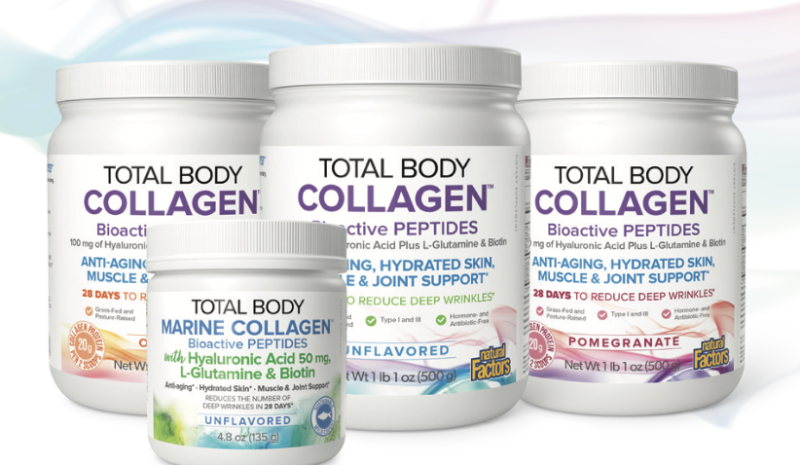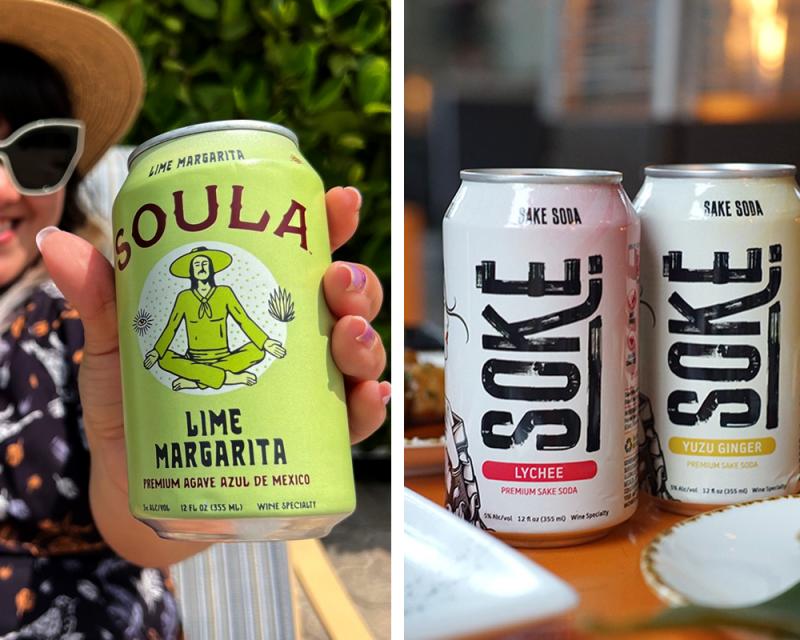Your Guide to Collagen

With so much information circulating about collagen, you’ve probably wondered if you should be taking a collagen supplement. Are its touted benefits for wrinkles and smoother skin true? Does taking collagen really help support your bones and joints? Let’s uncover everything you need to know about this popular protein.
Collagen 101
Collagen is a main structural protein found throughout the body. Often described as the “glue” that holds the body together, collagen provides strength and support to our connective tissue. [1] Collagen is made up of three chains of specific amino acids that form a triple helix and make up 25–35% of our total body protein. This abundant protein is commonly found in: [2]
- Skin
- Tendons
- Ligaments
- Cartilage
- Bones
- Blood vessels
There are currently 28 different types of collagen that have been identified in the body. Although there are five main types, type I accounts for 90% of the body’s collagen and can be found in the skin, cornea, blood vessels, bones, ligaments, and tendons. Type II is found in the cartilage and intervertebral discs, and type III is located in the skin and blood vessels. [2–4] These are the three collagen types commonly found in collagen supplements.
Unfortunately, the activity of our collagen-producing cells (called fibroblasts) starts to decline after the age of 30. Although our bodies continue to make collagen throughout life, it’s estimated that collagen production declines approximately 1.0–1.5% per year. [5] Collagen breakdown also occurs more quickly. Fine lines and deep wrinkles are a familiar outcome to many, but that’s not all that can happen. Other factors can accelerate collagen loss as we age, such as: [5,6]
- Smoking
- Poor nutrition
- Sun and pollution exposure
- Stress
- Genetics
- Loss of estrogen during menopause
Supporting collagen production is crucial in maintaining healthy skin, hair, nails, joints, and bones. From adopting healthy dietary and lifestyle approaches to taking specific supplements, there are many valuable solutions to help overcome the impact of collagen loss. One strategy that has gained much attention and popularity is using collagen supplements.
About Collagen Supplements
If you have ever shopped for a collagen supplement, you know first-hand that there is an overwhelming number of available choices.
Buyer beware! Not all collagen supplements are the same; they come in various forms and qualities. Consider these key facts for selecting a clean and supportive collagen supplement:
- Look for hydrolyzed collagen supplements. Collagen needs to be broken down so the body can use it. Hydrolyzed collagen has been broken down into smaller collagen peptides or small amino acid chains by a process called hydrolysis. In addition to being highly digestible and easily absorbed by the body, hydrolyzed collagen provides many advantages, such as being odorless and colorless. [7,8] This makes using hydrolyzed collagen very easy – it can simply be mixed into different foods and liquids (hot or cold!). After collagen peptides are consumed, they make their way throughout the body, acting as building blocks for collagen and elastin production. Collagen peptides can also stimulate fibroblasts to produce collagen and elastin and replace what has been lost because of aging and other factors. [7]
- Choose collagen supplements sourced from reputable bovine and marine sources. Collagen can only come from animal sources such as the skin, bones, and cartilage of cows, fish, chickens, and/or pigs. For your personal health and the health of the planet, it is important to choose reputable sources such as pasture-raised, grass-fed cattle and wild-caught fish.
- Pick collagen supplements that undergo third-party testing. All supplements, including collagen, can contain potential allergens, pesticides, solvents, GMOs, heavy metals, microbes, and pharmaceutical agents. When picking a collagen supplement, it is important to choose one that has undergone third-party testing to ensure the product is non-GMO, pure, potent, and accurately labeled.
Total Body Collagen™ from Natural Factors combines hydrolyzed collagen with complementary, clinically supported ingredients: hyaluronic acid, vitamin C, biotin, L-glutamine, and L-tryptophan. The result is an anti-aging and whole-body boost formula that does it all:
- Reduces deep wrinkles
- Helps increase skin elasticity and density while reducing the appearance of fine lines and crow’s feet
- Promotes healthy hair and strong nails
- Helps strengthen bones and muscles, promotes joint comfort and mobility, and supports gut health
Results can be seen in as little as 28 days! Total Body Collagen is available in a bovine-based powder in three flavors: unflavored, pomegranate, and orange. The pescetarian-friendly Total Body Marine Collagen™ is available as unflavored powder.
If you are looking to support the health of your hair, skin, nails, bones, and joints and are concerned about the impact of collagen loss with age, Total Body Collagen may be right for you! Collagen powders can be easily incorporated into hot and cold beverages (including your morning coffee!) plus different foods without affecting the flavor.
Continue your journey toward supporting collagen production with additional dietary and lifestyle changes, including:
- Eating protein-rich foods, such as chicken, fish, eggs, and beans
- Consuming bone broth regularly
- Eating vitamin C-rich foods, such as citrus, berries, and cruciferous vegetables
- Protecting your skin from sun exposure
- Wearing sunglasses
- Quitting smoking
- Managing stress
- Engaging in physical activity
References
- Wu M, Cronin K, Crane JS. Biochemistry, collagen synthesis. In: StatPearls [Internet]. StatPearls Publishing. [Updated 2021; cited 2022]. Available from: https://www.ncbi.nlm.nih.gov/books/NBK507709/
- Bielajew BJ, Hu JC, Athanasiou KA. Collagen: Quantification, biomechanics, and role of minor subtypes in cartilage. Nat Rev Mater. 2020; 5(10):730-47.
- Naomi R, Ridzuan PM, Bahari H. Current insights into collagen type I. Polymers (Basel). 2021; 13(16):2642.
- Copes F, Pien N, Van Vlierberghe S, et al. Collagen-based tissue engineering strategies for vascular medicine. Front Bioeng Biotechnol. 2019; 7:166.
- Reilly DM, Lozano J. Skin collagen through the lifestages: Importance for skin health and beauty. Plast Aesthet Res. 2021; 8:2.
- Liu T, Li N, Yan YQ, et al. Recent advances in the anti-aging effects of phytoestrogens on collagen, water content, and oxidative stress. Phytother Res. 2020; 34(3):435-47.
- León-López A, Morales-Peñaloza A, Martínez-Juárez VM, et al. Hydrolyzed collagen-sources and applications. Molecules. 2019; 24(22):4031.
- Skov K, Oxfeldt M, Thøgersen R, et al. Enzymatic hydrolysis of a collagen hydrolysate enhances postprandial absorption rate-A randomized controlled trial. Nutrients. 2019; 11(5):1064.
*These statements have not been evaluated by the Food and Drug Administration. These products are not intended to diagnose, treat, cure, or prevent any disease.



